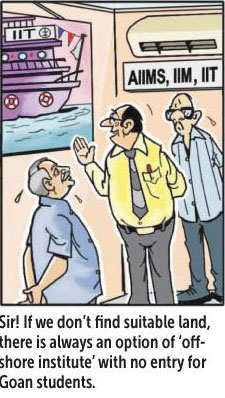24 Jun 2017 | 06:39am IST
Implementation of Mid-day meal scheme a major headache
Freddy Dias
The Union Human Resource Development (HRD) Ministry is conducting an evaluation study of the Mid-day Meal (MDM) scheme, implemented in schools across all states, to monitor and assess the efficacy of the same inorder to see its impact on attendance and enrolment of students in schools. The study is expected to assess the extent of coverage of the scheme and extent to which it has succeeded in achieving the objectives of making positive impact on overall enrolment and attendance of children in schools. It is also expected to help the HRD Ministry to decide whether the scheme should continue in its existing form or if changes should be introduced, including discontinuing practices that hamper the implementation process at the school level.
Following review of the scheme in Maharashtra in February 2017, the HRD Ministry pointed out the poor coverage of the scheme in five districts including Mumbai, the financial capital of the country, which topped the list of poor performing districts of MDM Scheme for the fourth consecutive year. The districts that reportedly have the lowest coverage of children under the MDM include Mumbai (64 per cent), Hingoli (66 per cent), Washim (68 per cent), Raigad (68 per cent), Jalna (69 per cent) and Latur (71 per cent) in both primary and upper primary schools. There are different reasons for the poor performance in each district, and certain corrective measures are needed to be introduced to bring about changes, if (they are) student-friendly. The state government’s data on the number of schools and students covered under the scheme from 2014-15 to 2017-18 show that the numbers have dropped drastically.
The HRD Ministry is carrying out the study through consultants to help the government establish whether there are loopholes or gaps in the implementation of the scheme in the schools. The expression of interest document issued by the Ministry said ‘to map the nature of participation of students from diverse social groups – SC ST, OBC and minorities – in the MDM in rural as well as in urban areas, and to assess the contribution of the scheme for social integration’. The study is expected to be completed by September 2017. Meanwhile, the MDM Scheme has been allocated Rs 10000 crore in the 2017-18 Union budget, up by Rs 300 crore from the previous budget.
Since the start, the implementation of the MDM scheme had become a major headache for most of the state governments across the country. Most states have outsourced mid-day meal supply to contractors on tenders to prepare and distribute the food. Unfortunately, the food supplied by the contractors is often found to be unhygienically prepared and is of sub-standard quality, and as a result there have been incidents wherein school children suffered food poisoning almost everywhere in the absence of overseers to address the problem faced in preparation and distribution of food under the scheme. Moreover, each state has different ways of getting the food prepared in the absence of an uniform centralised menu. The Union government has been emphasizing that the food supplied under the MDM scheme should be of nutritious quality, and that the endeavor primarily is to attract children to attend school and save them from the menace of malnourishment.
Recently, Prakash Javadekar-led HRD Ministry has shot down a request repeatedly pushed for by Rajasthan Chief Minister Vasundhara Raje to allow serving of pre-cooked food under the Centre’s mid-day meals. The Rajasthan CM has been strongly advocating pre-cooked meals pointing out that it is hygienic, easy to store, easier to prepare and can be served in little time without much manual/physical effort, besides it would help in maintaining uniform nutritional standards in each meal that is being served as well as enable serving of different menus on different days. The HRD Ministry has, however, formulated a position on the subject citing the MDM rules, 2015, the National Food Security Act, 2013, the MDM guidelines and the Supreme Court’s directions to firmly reinforce that the meal to be served to primary and upper primary children in government schools is mandated to be a ‘hot cooked meal’.
The subject has been a contentious one for years now. Before Raje, then Uttar Pradesh Chief Minister Mayawati had written to Prime Minister Manmohan Singh in 2007 suggesting that ready-to-eat frozen food be served under the MDM scheme as sub-standard food material was being used in preparation of the meals and children were frequently falling ill. Similarly, Women and Child Development (WCD) Minister in UPA-I, Renuka Chowdhury had advocated the introduction of ready-to-eat meals for children in Anganwadis in 2008, but it was rejected by the Union Cabinet.
Again in 2014, food processing minister Harsimrat Badal had a meeting with the PepsiCo (India) Chairperson and there were reports of proposals to develop nutritious processed food for the MDM scheme. This created a huge uproar, and both the HRD Ministry and Badal later strongly denied any such moves. Recently, Rajasthan CM Vasundhara Raje once again stepped in suggesting that the HRD Ministry re-evaluate the entire issue afresh and allow serving of ‘pre-cooked food’ under the MDM Scheme – arguing that even pre-cooked meals can be served hot. The HRD Ministry, however, said that it is of the firm view that rules and regulations do not allow any possibility of serving ready-to-eat pre-packaged food under the scheme and is now set to convey the same to all the State governments across the country.
Nutrition experts and committees too have repeatedly emphasised that a locally cooked hot meal is one of the best ways to provide nutritious food to children. Nutritionists and economists have warned against allowing private contractors and commercial interests to sneak into the business of supplying food to school children under the MDM Scheme.
(The writer is a freelance journalist).
